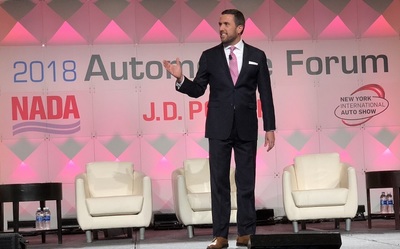No, Ridehailing And Shared Mobility Aren’t Denting Desire For Car Ownership
It's all about "freedom and flexibility" of owning a personal vehicle to ride-hailing services, says NADA’s Jonathan Collegio.
By David Kaplan
www.geomarketing.com.
Special To The Auto Channel From NADA
The National Automobile Dealers Association has comforting stats for its members who may be wondering if they should start feeling concerned about the rise of ride-hailing and shared mobility: nine-out-of-10 consumers surveyed prefer automobile ownership to using an app to call a car.
The survey of 1,200 consumers was commissioned by NADA and fielded by Luntz Global from March 2-5, 2018.
In a presentation of the survey’s results at the 2018 NADA / J.D. Power Automotive Forum, Jonathan Collegio, NADA’s senior vice president of public affairs, noted that the survey over-indexed for Millennials. The goal was to see whether having grown up with mobile and on-demand apps, whether there would be any discernible difference between interest in car ownership between younger consumers and the rest of the population.
“We wanted to know: Do technologies coming out of Silicon Valley actually resonate with Millennials? The ideas of automation, AI, are expected as inevitable,” Collegio said. “Only 1 in 10 were interested in giving up a personal vehicle in favor of using ridesharing services. The vast majority of consumers – across all age groups, education, and income levels – still wanted to rely on their own vehicle. They do not view owning a car as a nuisance or a cost-drag.
“So people don’t want to get rid of their cars,” he continued. “Is it a personal preference? A fear of the unknown? Or is there something durable and fundamentally desirable when it comes to car ownership?”
While the survey results indicated that Millennials who live in cities and tend toward the younger end of that cohort do evince greater desire to avoid the costs and issues associated with having a car in crowded and walkable urban environments, for the most part, most Americans still want a car of their own.
“Consumers overwhelmingly prefer the freedom and flexibility of owning a personal vehicle to ride-hailing services,” said Collegio. “This sentiment cuts across all demographics and is a durable, fundamental desire of most consumers, even Millennials. Ride-hailing will continue to supplement personal vehicle ownership going forward, but it will not supplant it.”
Owning A Self-Driving Car Has Appeal
It’s too soon to know whether the recent fatality in Arizona involving an autonomous vehicle operated by Uber and a pedestrian crossing a street may diminish the advance of driverless cars in the short term. Either way, that tragedy followed the NADA survey.
With that in mind, NADA’s survey shows consumers are generally open to autonomous vehicle technology, though a clear level of doubt persists.
About 56 percent of consumers said they would buy a fully or highly autonomous vehicle, while 44 percent said they would not.
Consumers by an 80-20 margin would prefer to capture 80 percent of the safety benefits from semi-autonomous vehicles they can still drive, as opposed to 100 percent of the benefit from fully autonomous, driverless vehicles.
“As an industry we have to understand our customers,” said Collegio. “And as the industry plans for the future, we hope they will more deeply study and investigate how consumers use, value, and enjoy relying on their personal vehicles.”
Among the study’s other topline findings:
- Nine out of 10 respondents (89 percent) said they would rather continue owning a car, versus one out of 10 respondents (11 percent) who said they would prefer using ride-hailing as their exclusive mode of personal transportation. This question was asked after presenting the strongest arguments for the safety, affordability and accessibility of autonomous ride-hailing services.
- This sentiment is overwhelming even among millennials, who prefer vehicle ownership by a 80-20 percent margin. Importantly, millennials in the suburbs or rural areas were six points less interested in ride-hailing than their urban counterparts.
- Consumers overwhelmingly view vehicle ownership as convenience, not a cost-drag or nuisance to own, as several studies suggest. Only 6.5 percent of consumers in the survey viewed owning a car as a hassle or costly nuisance.
- Consumers view wait times as a significant drawback of ride-hailing services. More than 88 percent of consumers said they would need to save at least $15 per day to incur an hour of aggregate waiting for ride-hailing services over a day. Half of consumers in the survey said they would need to save $50 per day to incur an hour of aggregate waiting time.



